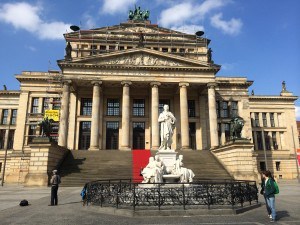Britain, along with the rest of the EU, faces a very interesting set of elections this week, for the European Parliament. Our polling day is Thursday 22 May, when there are also local elections in many parts of the country, including London, where I live. I am not an impartial observer of these elections, but I do try to express my views dispassionately, and set aside the pure propaganda. Here is what I think of the various contenders.
Let’s clear the decks a bit. I am thinking mainly about England; my knowledge of the politics of other parts of the UK is better than that of most English people, but that is a low bar indeed. In Northern Ireland I have a strong inclination towards the Alliance Party, because of its non-sectarian ethos. I dislike the Scottish Nationalist Party (SNP) mainly because I am a unionist. But I will say for its politicians that they put Scottish politics above Westminster politics; SNP politicians do not aspire to a place in the British cabinet. Still, this is less relevant to the European Parliament than elsewhere. I have rather more sympathy with Welsh Plaid Cymru, who tend to set out a clear social democratic, reformist agenda. But Welsh politics is messy, and I don’t feel confident talking about it.
And neither will I talk about the local elections. These should be determined by local issue and the local politicians’ records – and not the subject of a sweeping blog post like this one.
In England there are five contenders for your vote: the Conservatives, Labour, Ukip, the Greens and the Liberal Democrats. Voting for any other party is a wasted vote, even under our proportional system – since there is no system of transferable votes outside Northern Ireland. There are many other parties contesting these elections, but they simply don’t have enough traction to get up to the level needed win a seat. This is to be welcomed in the case of the BNP, who did manage to win a couple of seats last time, in 2009.
The party everybody is talking about is Ukip. The main reason offered by people for voting for them is that they are political outsiders, and that supporting them will give Britain’s established political elite a well deserved black eye. This is about the only good reason for voting for the party. They are chaotic and ill-disciplined, and they don’t take the work of the European Parliament seriously, and so their presence will damages the national interest. Inasmuch as you can detect clear views, they tend to be illiberal. If you are a Eurosceptic, there are other parties you can vote for who will do a better job of representing you and the country in this forum, which has significant political power, whether or not you accept that is a good thing.
But do our political elite deserve such a kicking? Many of the voters I have met on the streets think so; they feel let down. This is not just our newspapers stoking things up, with the rest of our media in tow. Politics has become too professional, and not enough politicians genuinely engage with voters. Focus groups and polling might be quite useful for informing politicians about what people are thinking, but they don’t help people feel involved. But will the shock of voters defecting to Ukip, or not voting at all, make them change their behaviour? There is little sign of this. I am not sure the problem is entirely soluble in a modern, developed society. But to make things better we need political reforms, not protests. These reforms need to make politicians more responsive to voters. This means changing our electoral system, and it means devolving more power to local levels where it is much easier to involve people in decisions.
The trouble is that Ukip stands for a sort of conservatism. They want political reforms, but focusing on the European level, not at the national level, where they are most needed. This sort of conservatism tends to reject useful reforms, as we saw in the debate on the Alternative Vote system (which would have been a small step in the right direction), and the soft spot so many people seem to have for our appointed House of Lords. It’s not the right kind of kicking, and it is the wrong election to do the kicking at.
Most Eurosceptics would be better served by the Conservative Party. The Conservatives have a clear view on Europe: renegotiation and a referendum. This is surely the most sensible way forward if you believe that being part if the EU is bad for the country. The European Parliament cannot deliver on this agenda – but Conservative MEPs will be taken much more seriously in Brussels than Ukip ones, and will thus do a better job of representing the country – though they would have had much more influence if they had not left the parliament’s Christian Democrat grouping.
But is a referendum right for the country? Like many supporters of the European project I dither on this. I don’t think it is a good idea for the UK to leave the EU. This is mainly because emotionally I feel a strong European identity (maybe because I have lived a short while outside Europe). But more practically, our obligations within the Union are forced on us by our economic circumstances, and leaving it would make little difference. It would be a colossal waste of political effort that should be devoted to other issues. Meanwhile the uncertainty it would create, as so many things of commercial importance are renegotiated, would blight the country exactly where it can least afford it. Many of the same arguments apply to just having a referendum on the issue – never mind actually leaving. The main argument for a referendum is that it would lance the boil and let the country move forward. I would sooner wait until the EU is forced to undertake more significant structural reform that anything the UK can force on its own.
And so to the Labour Party. Their campaign for the European Parliament is focused on the “cost of living crisis”. Regardless of the merits of this, it is exactly the sort of irrelevant focus-group based politics that has given politicians such a bad name. Their election literature mentions practically nothing about Europe or the European Parliament. This kind of cynical campaigning should be rejected. Politicians should be courageous; currently Labour only want to play safe. I can respect David Cameron for his referendum strategy on Europe, which required quite a bit of courage. Labour are running from the fight.
And the Greens? They deserve respect: their literature (at least here in London) at least talks about what they would do in the European Parliament. They don’t talk about Britain in Europe, but about the sort of Europe they want. That is what these elections should be about. I am just less than convinced about their vision. For me it is too anti-business. Good intent is no substitute for knowhow. We should be pushing Europe towards an environmentally sustainable future – but we have to take the public with us. We have to challenge big business vested interests – but also allow big business to keep people in jobs, and provide that element of economic stability people crave. I don’t think the Greens have a clear idea of how to get that balance right.
Which leaves the Liberal Democrats. The Lib Dems are the most Europhile of the parties (though quite a few Europhiles inhabit the Labour Party and the Greens). This has one particular advantage: it means that they part in the European Parliament’s processes with more enthusiasm, and so are much more influential than they would be otherwise. Liberal Democrats have held some very influential positions (such as Sharon Bowles’s chairing of the Economic & Monetary Affairs Committee). In this work they do a good job of standing up for British interests – and can actually talk about their track record in the Parliament with pride. They have also shown a lot more courage in standing up for a pro EU position – unlike the Labour Party – and unlike the party has done in previous elections to the European Parliament. You may not think all of their pro EU arguments are convincing (though the same can be said of most of the anti EU arguments), but they have done the campaign a service by talking about it.
Right through the country’s history Britain, and England before it, has never been sure about the role it should take in Europe. There have been times when the country has successfully pursued a global agenda while retaining minimal involvement in European affairs, such as in the mid to later 18th and 19th Centuries. At other times the country has been a fully fledged player, such as Waterloo in 1815 and the First and Second World Wars in the 20th Century. Right now the country’s dependence on trade leaves it no option but to be heavily involved in its European connections, whether or not the country stays in the EU. I believe that means that the country’s leaders should try to shape the EU from within. Others feel that by leaving the EU, it will be easier for the country to find the best path in the world. If you share my view, then the Liberal Democrats are the party for you. If you don’t, then you might still consider voting for the party as highly effective operators in the parliament. Otherwise think of voting Conservative or Green. Don’t vote for Labour or Ukip, whose campaigns are taking British politics in entirely opposite but wrong directions.





